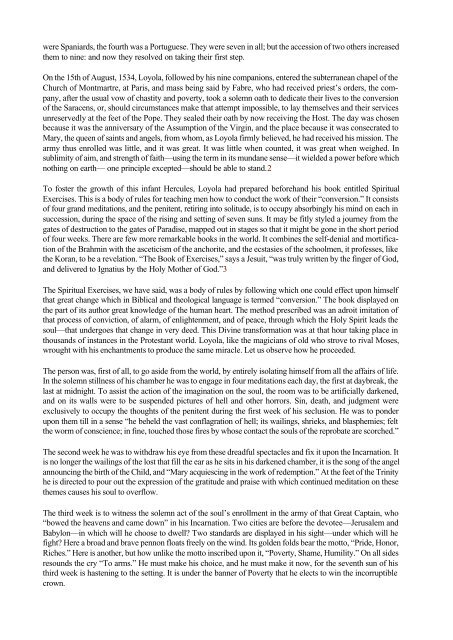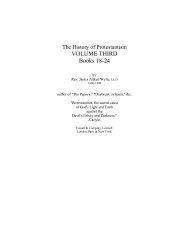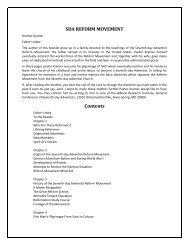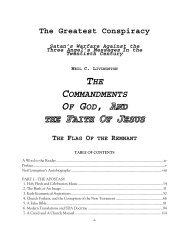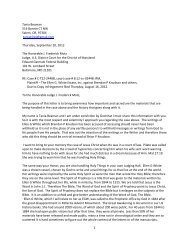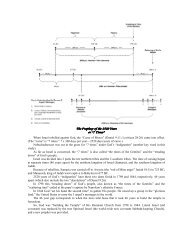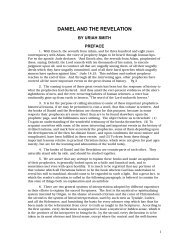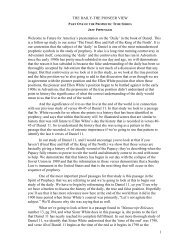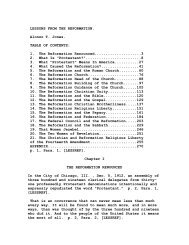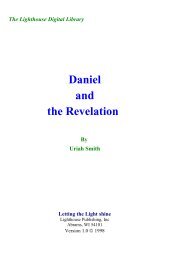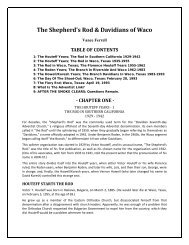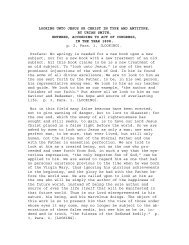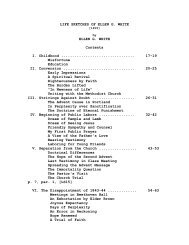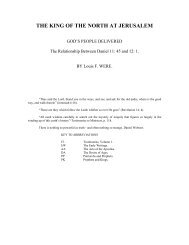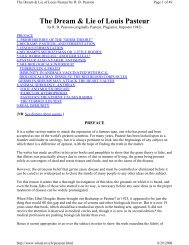History of Jesuits
History of Jesuits
History of Jesuits
Create successful ePaper yourself
Turn your PDF publications into a flip-book with our unique Google optimized e-Paper software.
were Spaniards, the fourth was a Portuguese. They were seven in all; but the accession <strong>of</strong> two others increased<br />
them to nine: and now they resolved on taking their first step.<br />
On the 15th <strong>of</strong> August, 1534, Loyola, followed by his nine companions, entered the subterranean chapel <strong>of</strong> the<br />
Church <strong>of</strong> Montmartre, at Paris, and mass being said by Fabre, who had received priest’s orders, the company,<br />
after the usual vow <strong>of</strong> chastity and poverty, took a solemn oath to dedicate their lives to the conversion<br />
<strong>of</strong> the Saracens, or, should circumstances make that attempt impossible, to lay themselves and their services<br />
unreservedly at the feet <strong>of</strong> the Pope. They sealed their oath by now receiving the Host. The day was chosen<br />
because it was the anniversary <strong>of</strong> the Assumption <strong>of</strong> the Virgin, and the place because it was consecrated to<br />
Mary, the queen <strong>of</strong> saints and angels, from whom, as Loyola firmly believed, he had received his mission. The<br />
army thus enrolled was little, and it was great. It was little when counted, it was great when weighed. In<br />
sublimity <strong>of</strong> aim, and strength <strong>of</strong> faith—using the term in its mundane sense—it wielded a power before which<br />
nothing on earth— one principle excepted—should be able to stand.2<br />
To foster the growth <strong>of</strong> this infant Hercules, Loyola had prepared beforehand his book entitled Spiritual<br />
Exercises. This is a body <strong>of</strong> rules for teaching men how to conduct the work <strong>of</strong> their “conversion.” It consists<br />
<strong>of</strong> four grand meditations, and the penitent, retiring into solitude, is to occupy absorbingly his mind on each in<br />
succession, during the space <strong>of</strong> the rising and setting <strong>of</strong> seven suns. It may be fitly styled a journey from the<br />
gates <strong>of</strong> destruction to the gates <strong>of</strong> Paradise, mapped out in stages so that it might be gone in the short period<br />
<strong>of</strong> four weeks. There are few more remarkable books in the world. It combines the self-denial and mortification<br />
<strong>of</strong> the Brahmin with the asceticism <strong>of</strong> the anchorite, and the ecstasies <strong>of</strong> the schoolmen, it pr<strong>of</strong>esses, like<br />
the Koran, to be a revelation. “The Book <strong>of</strong> Exercises,” says a Jesuit, “was truly written by the finger <strong>of</strong> God,<br />
and delivered to Ignatius by the Holy Mother <strong>of</strong> God.”3<br />
The Spiritual Exercises, we have said, was a body <strong>of</strong> rules by following which one could effect upon himself<br />
that great change which in Biblical and theological language is termed “conversion.” The book displayed on<br />
the part <strong>of</strong> its author great knowledge <strong>of</strong> the human heart. The method prescribed was an adroit imitation <strong>of</strong><br />
that process <strong>of</strong> conviction, <strong>of</strong> alarm, <strong>of</strong> enlightenment, and <strong>of</strong> peace, through which the Holy Spirit leads the<br />
soul—that undergoes that change in very deed. This Divine transformation was at that hour taking place in<br />
thousands <strong>of</strong> instances in the Protestant world. Loyola, like the magicians <strong>of</strong> old who strove to rival Moses,<br />
wrought with his enchantments to produce the same miracle. Let us observe how he proceeded.<br />
The person was, first <strong>of</strong> all, to go aside from the world, by entirely isolating himself from all the affairs <strong>of</strong> life.<br />
In the solemn stillness <strong>of</strong> his chamber he was to engage in four meditations each day, the first at daybreak, the<br />
last at midnight. To assist the action <strong>of</strong> the imagination on the soul, the room was to be artificially darkened,<br />
and on its walls were to be suspended pictures <strong>of</strong> hell and other horrors. Sin, death, and judgment were<br />
exclusively to occupy the thoughts <strong>of</strong> the penitent during the first week <strong>of</strong> his seclusion. He was to ponder<br />
upon them till in a sense “he beheld the vast conflagration <strong>of</strong> hell; its wailings, shrieks, and blasphemies; felt<br />
the worm <strong>of</strong> conscience; in fine, touched those fires by whose contact the souls <strong>of</strong> the reprobate are scorched.”<br />
The second week he was to withdraw his eye from these dreadful spectacles and fix it upon the Incarnation. It<br />
is no longer the wailings <strong>of</strong> the lost that fill the ear as he sits in his darkened chamber, it is the song <strong>of</strong> the angel<br />
announcing the birth <strong>of</strong> the Child, and “Mary acquiescing in the work <strong>of</strong> redemption.” At the feet <strong>of</strong> the Trinity<br />
he is directed to pour out the expression <strong>of</strong> the gratitude and praise with which continued meditation on these<br />
themes causes his soul to overflow.<br />
The third week is to witness the solemn act <strong>of</strong> the soul’s enrollment in the army <strong>of</strong> that Great Captain, who<br />
“bowed the heavens and came down” in his Incarnation. Two cities are before the devotee—Jerusalem and<br />
Babylon—in which will he choose to dwell? Two standards are displayed in his sight—under which will he<br />
fight? Here a broad and brave pennon floats freely on the wind. Its golden folds bear the motto, “Pride, Honor,<br />
Riches.” Here is another, but how unlike the motto inscribed upon it, “Poverty, Shame, Humility.” On all sides<br />
resounds the cry “To arms.” He must make his choice, and he must make it now, for the seventh sun <strong>of</strong> his<br />
third week is hastening to the setting. It is under the banner <strong>of</strong> Poverty that he elects to win the incorruptible<br />
crown.


